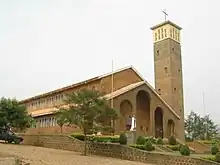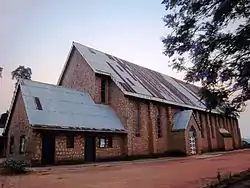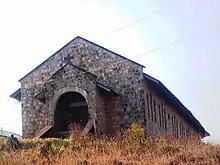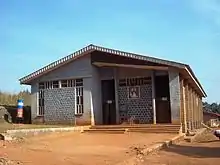Roman Catholic Diocese of Kumbo
The Roman Catholic Diocese of Kumbo (Latin: Dioecesis Kumboënsis) is a Roman Catholic diocese in the Ecclesiastical Province of Bamenda in Cameroon. The first German settlers were Missionaries of the Sacred Heart who arrived in 1912 and established their mission in 1913. The Diocese of Kumbo was erected by Pope John Paul II on Thursday, 18 March 1982, with territory taken from the then Diocese (now Archdiocese) of Bamenda. It is a suffragan diocese of the Metropolitan See of Bamenda along with the Roman Catholic Dioceses of Buea, Kumba (not to be confused with Kumbo), and Mamfe.
Diocese of Kumbo Dioecesis Kumboensis | |
|---|---|
| catholic | |
 Kumbo Cathedral | |
| Location | |
| Country | Cameroon |
| Territory | Comprises Bui and Donga-Mantung Divisions. |
| Ecclesiastical province | Bamenda |
| Metropolitan | Bamenda |
| Deaneries | 6 |
| Coordinates | 6.2053°N 10.6872°E |
| Statistics | |
| Area | 8,600 km2 (3,300 sq mi) |
| Population - Total - Catholics | (as of 2011) 789,000 202,543 (25.7%) |
| Parishes | 27 |
| Information | |
| Denomination | Roman Catholic |
| Rite | Latin Rite |
| Established | 18 March 1982 |
| Cathedral | Cathedral Church of Saint Therese of the Child Jesus |
| Secular priests | 83 |
| Current leadership | |
| Pope | Francis |
| Bishop | George Nkuo |
| Metropolitan Archbishop | Cornelius Fontem Esua |
| Vicar General | Roland Berngeh |
| Episcopal Vicars | Paul Verla, SD; Joseph Dufe, OFM.Cap |
| Website | |
| www | |
The Diocese of Kumbo is made up of two civil administrative units, namely, Bui and Donga-Mantung Divisions in the North West Region of the Republic of Cameroon. Bui Division is further divided into 6 subdivisions: Kumbo Central, Jakiri, Oku, Mbven, Nkum and Noni, while Donga-Mantung Division is divided into 5 subdivisions, viz: Nkambe Central, Ndu, Ako, Misaje and Nwa.
The territory of Bui and Donga-Mantung Divisions situated in the Bamenda grassfields area of the North West Region of Cameroon covers a surface area of 8,000 square kilometers (3,090 square miles) with a population of approximately 789,000 of whom over 202,543 (25.7%) are Catholics. There are 11 ethnic groups: Nso’ tribe, the Oku tribe and the Noni tribe in Bui Division, and the Wimbum, Mbembe, Jukum, Nchanti, Mfumte, Yamba, Mbaw and Mambila tribes in Donga-Mantung Division. Each of these tribes has its own language and dialects.
Considering the fact that the average annual population growth is about 2.36%, the total population of the diocese has grown from 653,244 in 1998 to 734,052 in 2003. Since the area of the territory is about 8,000 km2, the population density is about 92 people per km2. This is one of the densely populated Catholic dioceses in Cameroon.

Religious Data
There are three main religious groups in the Diocese of Kumbo, namely, the Christians, the Muslims and the adherents of the African Traditional Religion. The present statistics reveal that the adherents of the African Traditional Religion are still the majority, followed by the Christians in the second place and then the Moslems. The Christians are further regrouped into Catholics, Presbyterians, Baptists and some Evangelical and Pentecostal Communities like the Churches of Christ and the Deeper Life Church. The population of this latter group is very insignificant, made up mainly of drop-outs from the other Christian groups.
The Catholic Population
The Catholic population has continued to grow steadily, with an average of about 4,140 baptisms per year, and about 5,429 catechumens per year.
The Protestant Population
There are no available statistics from the main Protestant Churches, namely, the Presbyterian Church in Cameroon (PCC) and the Cameroon Baptist Convention (CBC).
The evangelical groups, like the Churches of Christ and Deeper Life Church, which can be considered as sects, recruit their followers from the mainline Protestant Churches. They are very active among students and young people.
Islam
There are also no available statistics about the Muslims. In the Kumbo urban area there are two Islamic secondary schools and a Teacher Training College.
The Moslem population is made up of the traditionally Islamic tribes, the Hausa people, the Fulanis and the Wodaabe or the Bororo people, who are mostly grazers, and those from the local tribes who have been Islamized. The greater bulk of this category and of the Moslems in general is found among the Nso Tribe. They win some of their converts, especially women, through marriage and by giving cows as bait to the young people who want to get rich overnight.
The African Religions
The adherents of the African Religions still constitute the bulk of the population. As with Islam, there are no statistics about them.
Pastoral Zones and Special churches
The cathedral is Saint Therese of the Child Jesus Cathedral in Kumbo. Below is a full list of Deaneries and Parishes in the two civil administrative units that make up the Diocese of Kumbo.
Bui DivisionKumbo Deanery
Tatum Deanery
Nkar Deanery
Djottin Deanery |
 Holy Family Parish Church, Tabenken. Tabenken Parish was opened in 1937 from Shisong. Donga-Mantung DivisionTabenken Deanery
Nkambe Deanery
 Old Church of Saint Martin de Porres Parish, Binju-Nkambe. Binju-Nkambe was opened in 1955 from Tabenken.
|
Bishops
- Bishops of Kumbo (Roman rite), in reverse chronological order
- Bishop George Nkuo (since 8 July 2006)
- Bishop Cornelius Fontem Esua (10 September 1982 – 7 December 2004), appointed Coadjutor Archbishop of Bamenda
Other priest of this diocese who became bishop
- Agapitus Enuyehnyoh Nfon, appointed Auxiliary Bishop of Bamenda in 2011
Governance
The diocese of Kumbo is led by
- The Bishop
- The Vicar-General
- Two Episcopal Delegates or Vicars
- The Vicar for Catechists
- The Vicar for Laity
- The Council of Priests
- The Chairman for the Association of Diocesan Priests (ADP)
Additionally, there is a Presbyteral Council, various consultative Committees and Commissions and each Deanery has a Dean or a Vicar Forane.
Religious Communities
MALE CONGREGATIONS
Priests
- Saint Joseph's Society for Foreign Missions, (Mill Hill Missionaries), MHM
- Order of Friars Minor Capuchin, O.F.M. Cap
- Congregation of the Priests of the Sacred Heart of Saint Quentin, SCJ
- Order of the Poor Clerics Regular of the Mother of God of the Pious Schools or the Piarist Fathers, (Calasanzians), Sch. P
- Missionary Sons of the Immaculate Heart of Mary - Claretian Missionaries (CMF)
- Rogationists of the Heart of Jesus, RCJ
Brothers
- The Marist Brothers of the Schools (FMS)
FEMALE CONGREGATIONS
Sisters
|
Sisters
|
Catholic Education
Vocational Training
Professional Education
|
Formation in Pastoral Ministry
|
Secondary Education
Catholic Schools and Colleges
|
Catholic Schools and Colleges
|
Other services
The Diocese of Kumbo, in addition to the work within the 27 parishes, operates some services centrally. The best known of these are BEPHA (the Diocesan Service for Health Care), the Printing and Communication Centre (PCC), a Carpentry and Construction Department, a Mechanical and Technical Training Centre (MTTC) and the Catholic Book Centre (CABOC). The Diocese also operates Pilot Agricultural Training Projects at Mfumte, Mbiame and Misaje.
The Diocese is also runs the FACTS Project for Catholic schools and colleges. There are also outreach programmes for orphans and vulnerable children. The diocese is also home to Community Based Organization (CBO) programme for local communities and underprivileged children.
Gallery
 Panorama of the Town of Kumbo, taken from Tobin
Panorama of the Town of Kumbo, taken from Tobin Bell Tower of the cathedral.
Bell Tower of the cathedral. Immaculate Conception Hill
Immaculate Conception Hill Cathedral from the Bookshop Side
Cathedral from the Bookshop Side Facade of the Cathedral Parish Church of Kumbo
Facade of the Cathedral Parish Church of Kumbo Bishop's House & Diocesan Secretariat
Bishop's House & Diocesan Secretariat Catholic Education Secretariat
Catholic Education Secretariat Central Nave and Ceiling of the Cathedral
Central Nave and Ceiling of the Cathedral Main Nave and Long View of the Main Altar
Main Nave and Long View of the Main Altar Rear View and Ceiling of the Cathedral
Rear View and Ceiling of the Cathedral Closer Look of the Main Altar of the Cathedral
Closer Look of the Main Altar of the Cathedral Sisters Convent on Bishop's Hill
Sisters Convent on Bishop's Hill Statue of Saint Thérèse in front of the Cathedral
Statue of Saint Thérèse in front of the Cathedral Bell Tower of the cathedral from Small Market Side
Bell Tower of the cathedral from Small Market Side Chapel of Saint Aloysius Minor Seminary, Kitiwum
Chapel of Saint Aloysius Minor Seminary, Kitiwum Statue of an Eagle in front of the Cathedral
Statue of an Eagle in front of the Cathedral New Binju-Nkambe Parish Church.
New Binju-Nkambe Parish Church. Saint John the Baptist Parish Church, Elak-Oku.
Saint John the Baptist Parish Church, Elak-Oku. Saint Joseph Quasi - Parish Church, Ndzevru.
Saint Joseph Quasi - Parish Church, Ndzevru. Christ the King Parish Church, Nkambe Town.
Christ the King Parish Church, Nkambe Town.
See also
References
External links
- Official website

- http://shisonghospital.org/wordpress/
- http://kumbo-limburg.blogspot.it/
- Tertiary Sisters of St. Francis - Cameroon
- http://shisonghospital.org/wordpress/wp-content/uploads/2011/04/Identity-of-the-Sisters-and-Hospital.pdf
- http://shisonghospital.org/wordpress/cardiac-centre/the-archbishop-paul-verdzekov-memorial-heart-foundation/membership/
- http://binjunkambe.wordpress.com/
- http://binju-nkambe.blogspot.it/
- GCatholic.org
- (This history of the Diocese of Kumbo is reproduced from: Firm in the Faith: 75 Anniversary of the Catholic Church in Kumbo diocese, printed by Grafiche Dehoniane Bologna in 1987, pp. 8 – 17).
- Catholic School of Health Sciences, Shisong